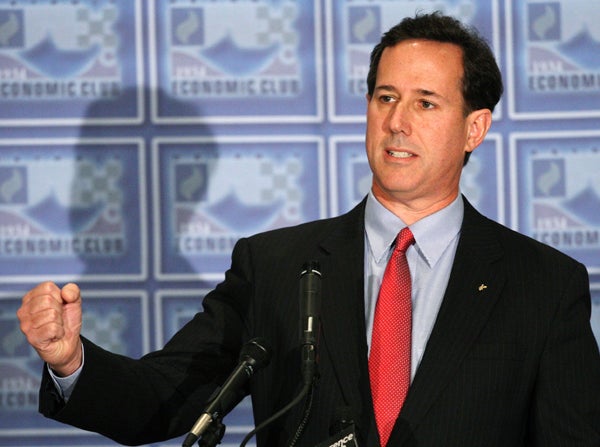|
February 17, 2012
Q&A: Stanford's Morris Fiorina on Santorum's rise and a dissatisfied Republican Party
Santorum is surging in the polls, Romney is having a hard time relating to voters and there's a real possibility the GOP could have no nominee by the time the convention rolls around, says political scientist Morris Fiorina. By Brooke Donald

Republican presidential candidate Rick Santorum (Photo: Rebecca Cook / Reuters) Several recent polls have shown Republican presidential candidate Rick Santorum surging in popularity among voters nationwide, and running even with Mitt Romney in Michigan, where voters go to the polls later this month.
Santorum casts himself as the "true conservative" in the Republican field, and has found most of his support among voters who describe themselves as evangelical Christians, Tea Party supporters and social conservatives.
For an explanation on Santorum's rise and the state of the Republican field, the Stanford News Service spoke with political science Professor Morris Fiorina, who is also a senior fellow at the Hoover Institution. Here are excerpts from the interview.
How do you explain Santorum's popularity?
The fact that he has emerged as the newest front-runner simply reflects the continuing dissatisfaction on the part of the Republican base with Romney. While Santorum is a very polarizing figure, there is no alternative left.
Why isn't Romney catching on?
One reason is that he doesn't connect. Ordinary people can imagine having a drink with some of these people but not Romney. He's like Al Gore and Michael Dukakis in that respect. There is also the history of flip-flopping. You have a sense that there is no core. There are a lot of people who are asking, "What are we getting if we nominate him?"
But Romney has so much more money than Santorum. Will that hurt Santorum?
You could have all the money in the world but if you don't have a message that inspires people, it's going to be hard to get them to come out and vote.
Santorum has been winning with the support of social conservatives. How does he continue that momentum going into a state like Michigan, where jobs dominate the discussion, not social issues?
Voter turnout is the answer. Participation is lower than many people realize – less than 2 percent in the Colorado and Minnesota caucuses Santorum won last week and only about 7 percent in the Missouri primary. So, it doesn't take too many social conservatives to make a big splash. Even if the larger electorate is much more concerned with jobs – and it is, the economy dwarfs everything – all you need if you're Santorum is the anti-abortion, anti-gay-marriage folks to get really excited and go to the polls for you.
What explains Santorum's rise even as Romney's been trumpeted as the most electable in a contest against President Obama?
Romney's electability argument has been badly weakened. He has not been able to close the deal on his candidacy. There's been one gaffe after another: the $10,000 bet, "$365,000 is not a lot of money for speaking fees," "I'm not concerned about poor people." You can see Obama's attack ad producing itself. Republican voters may say, "None of these guys have a good chance of beating Obama, so I may as well vote for the one I really believe in."
If none of these candidates is electrifying Republicans and the front-runner keeps changing, what's the prospect for anyone clinching the nomination soon?
If you want to get really strategic, maybe the thought now is to support whoever is running closest to Romney in each contest so as to split the delegates. Then you end up with an open convention and you can haul in one of the people who everybody prefers to the current field, like Gov. Chris Christie of New Jersey, Gov. Mitch Daniels of Indiana, Rep. Paul Ryan of Wisconsin, Jeb Bush, even former Minnesota Gov. Tim Pawlenty, who earlier dropped out of the race.
An open convention is actually possible?
Political scientists always hope for open conventions and we're always disappointed, but I think the odds of it happening this year are higher than any time in my professional life. The whole Republican establishment is shaking their heads and thinking, "My God, is this all we have to put against Obama?" So it would not surprise me if there were suggestions behind the scenes that if Romney can't recover quickly and resume his march to the nomination, then at that point it's none of the above and do what you can to produce an open convention.
If the primary fight doesn't yield a winner soon, could California be considered competitive?
If it's a long drawn out process, and if no one approaches a majority by summer, California becomes very important. You'll even see them campaigning in the Bay Area. So it could be a really different experience for California to be relevant in the Republican primaries. And a candidate like Santorum might actually play pretty well in the California Republican primary. California Republicans are heavily into social issues, which is a large part of the explanation for why they keep losing.
-30-
|